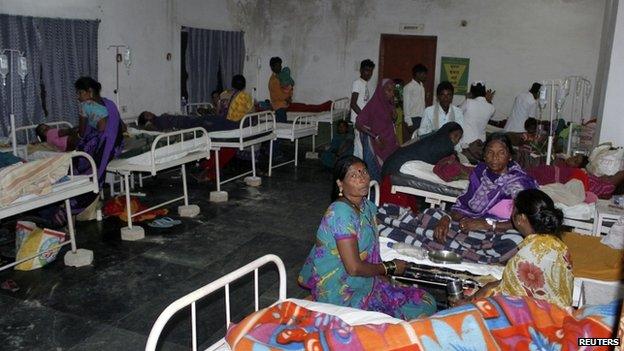Indian media: Anger over sterilisation deaths
- Published

Papers say the deaths of 13 women highlight India's appalling healthcare system
Media are "angry" over the "shocking" deaths of 13 women who underwent botched sterilisation surgery at a state-run health camp in central India.
Medical guidelines were not followed in the surgeries that were carried out on Saturday in Pendari village in Bilaspur district of the central state of Chhattisgarh, reports said.
About 60 others are still in hospital and at least 20 are in a critical condition following the tubectomy operations.
The guidelines say a single surgeon cannot conduct more than 10 operations with a single instrument, The Indian Express, external reports.
"But in Bilaspur, just one doctor conducted 83 operations with one instrument in five hours - less than four minutes per operation," the paper adds.
The hospital where the surgeries were conducted was also "closed, almost abandoned" for about a year and did not meet the standards of government-recognised "established healthcare facilities", the paper says.
Another report, external in the paper says "many of the women were medically unfit and did not want to opt for the procedure. Some were diabetic, some had severe asthma, and there were some with heart problems".
Papers say the tragedy highlights the "murky world" of mass sterilisations in India.
"Deaths due to sterilisation are not a new problem in India, where some 4.6 million sterilisations were performed in 2013-14, government figures show. Many die as a result of botched surgeries, while others are left bleeding and in agony," the Hindustan Times, external reports.
More women get sterilised than men in India, The Times of India, external says.
Almost 98% of the sterilisations conducted last year were "tubectomies, that is, female sterilisation", the paper reports.
"The larger truth hidden in the government's sterilisation efforts is that it is almost exclusively directed at women. This is because men are under the misapprehension that sterilisation will affect their 'manliness' or virility," the paper further says.
The Indian Express, external agrees that women bear the brunt of India's family planning.
The Bilaspur tragedy "underlines how India's family planning burden rests disproportionately on women's shoulders. This despite the fact that male sterilisation is actually a relatively easier and risk-free procedure," the paper says
'No girls in library'
Meanwhile, a top official of a university in the northern India state of Uttar Pradesh has drawn criticism over his allegedly "sexist" remarks.
Zameer Uddin Shah, the vice-chancellor of Aligarh Muslim University, reportedly said there would be "more boys" in the library if girls were allowed entry.
Human Resource Development Minister Smriti Irani has sought an explanation from the university regarding the remark, calling it an "insult to daughters", the Hindustan Times, external reports.
Mr Shah, meanwhile, has rejected allegations that his remarks were "sexist".
"We have nothing against girls, it is not that we are sexist or are discriminating against girls. But there is problem of space, of security. And the books are, after all, available to the girls. You just go online, click a button, and it is delivered next day," The Indian Express, external quotes him as saying.
And finally, Prime Minister Narendra Modi discussed enhancing "regional connectivity" with his Myanmar [also knows as Burma] counterpart Thein Sein on Tuesday in Nay Pyi Taw, The Indian Express , externalreports.
"During the meeting, both leaders are learnt to have reviewed the progress of major connectivity projects between the two countries, including the India-Myanmar-Thailand trilateral highway and the Kaladan transport project," the paper says.
Mr Modi is on a three-nation Asia-Pacific tour. He will attend the Asean and East Asia Summit in Myanmar before heading on Friday to Australia - the first by an Indian PM in 28 years - to attend the G20 summit.
The last leg of his tour will take him to Fiji.
BBC Monitoring, external reports and analyses news from TV, radio, web and print media around the world. For more reports from BBC Monitoring, click here. You can follow BBC Monitoring on Twitter, external and Facebook, external.